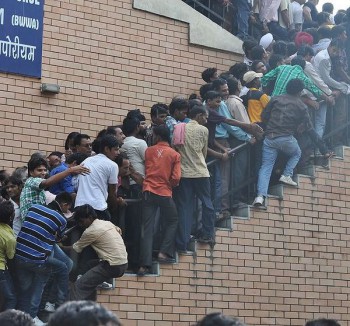01/24/2014
Waiting in line? But what line??
It all began with an innocent question asked at breakfast by my new favorite Indian: “Tell me, all the French are as close to their family as you are? I was wondering, because Westerners are known to be individualistic, you know, so it’s a bit confusing... »
And BAM take that in the face! But I managed to keep my cool and patiently listen to his explanations of the Indian concept of the family which takes precedence over the individual.
On the other hand I did not miss him a few weeks later, with a formidable smash: “The next time you tell me Westerners are individualistic (as opposed to Indians), I send you to the ladies’ line for bag screening with the Indian women, non mais attends!”
We have all experienced it in India, and not only once, and at various levels... You are waiting in line to put your bag on the belt and an Indian woman, and then another Indian woman, just cut the line under your nose… Like nothing has happened...
Yes, it happens in every line, or almost. Except that this time, to help the women who were being cut and getting upset but not daring to say anything, I used my body to block access to the belt and then BAM! an Indian woman threw her bag over my shoulder! The security man had the goodness to interfere before the ladies threw themselves at each other...
So you start wondering. Assholes who see a line and cut it exist everywhere – the French even have quite a reputation as experts in line cutting! But in this case? It was not a typical case of assholes-cutting-the-line, so what??
A plausible explanation to this common behavior in India would be the fact that demand is superior to the supply for almost everything here, due to the urban overpopulation: somehow they have to fight for everything. For instance, it is out of question to wait in a line to get into a local train in Mumbai, otherwise you can spend the night on the quay. It is much more recommended to step on your neighbors’ heads. But well, at the airport the scenario is quite not the same...
I was very curious to understand what goes on in the heads of these women who see people waiting in a line and simply and purely ignore it. And my favorite Indian cared to give me an explanation, a very simple one:
- “They must have things to do in the destination place and are in a rush to go.
- But me too I have things to do, they can’t think of that?
- Then they must assume that what they have to do and hence their flight is more important than yours.”
And booooom! Who is individualistic now huh darling??! Maybe most of human beings think they come first in this world no?
We finally discussed this topic a bit further. It appears that Indians and French probably have the same attachment to their family.
In France, we are ‘individualists’ in the sense that we are looking for our personal happiness – we put ourselves before the society; but isn’t it a necessary condition to make our loved ones happy (being happy yourself)? And God knows that this individual pursuit of happiness is not easy... And that’s how, at eighteen we leave home to go dig our own path and build our own nest. This is not running away from our responsibilities (as it is perceived here), but quite the contrary.
In India, it has more to do with order; there is a whole lot of rules (religious, social order, family order) and making sure this order is not disturbed is what seems to make them happy (or at least free of guilt for doing the wrong thing). And that’s how they live their entire lives with their parents and that, past the golden age of childhood, they start working at repaying their parents for everything they have done for them. But it doesn’t cost them because their children will do the same! Their life is kind of pre-written: you will study this, start working at this age, marry at this age etc. and doing this will make your family happy so you just go for it. Not everybody follows that of course.
Their killer argument (or so they believe) to defend the Indian system is the divorce rates and elderly being dumped in homes in the West. Which leads them to assume that family means nothing to us...
Take the French statistics. If half of the marriages end up in a divorce, it is mainly at the request of women, and especially the active woman (1). A sign that becoming independence enables women to take less crap? Far from me the idea of advocating for divorce which, in my opinion, remains a traumatic event, even if more and more commonplace. But maybe it is a blessing in disguise, if women are happier then... And anyway it is the way it is! In conclusion, it is not so much that the family does not count for us, it is that the concept of the family evolves... For us, a couple who lives together without being married is a family. In India it was a crime up to 2010 (2). But it has been slowly changing, at the pace of the ‘Indian elephant’ (whose economy is growing slowly but surely, bringing along its societal changes...) (3).
And as far as the elderly are concerned, if getting rid of them by sending them in hospices is nothing glorious, all retirement homes are not the same and also very few elderly actually live in such facilities – among the 75-79 years, only 3% live in institutions for elderly persons in France (4). And in fact, the number of homes where old people live in a place adapted to their movements, with proper medical assistance, activities, and buddies, has been exploding in India (5). I am always surprised when my Indian friends tell me about the family members living with them and mention a grandfather almost invalid who stays parked in his room the whole day and is the charge of a family member (without medical qualifications).
(1) In France, in 2011, 44.7% of marriages end up in a divorce. In 3 out of 4 cases, the applicant's divorce are women and 68% of the women divorcing have a professional activity. The type of divorce in France has also heavily changed: divorce by mutual consent reached 54% in 2010. Source: http://www.planetoscope.com/lamour/1062-nombre-de-nouveaux-divorces-en-france.html; global statistics and fun facts: http://www.huffingtonpost.com/2012/06/01/divorce-rate-how-well-do-_n_1562900.html
(2)http://www.liveintogether.com/live-in-laws-India.asp
(3) http://www.huffingtonpost.com/2011/04/12/india-divorce-rate-rise_n_848201.html
(4) Among the 90-99 years, 22% of men and 37% of women live in a facility for the elderly. Source: http://www.lesmaisonsderetraite.fr/maisons-de-retraite/chiffres-statistiques.htm
08:00 Posted in Incredible India!, My stories in India, Why in India... | Permalink | Comments (0) | Tags: india, west, individualist, individualistic, behavirour, line, waiting in line, line-cutting, marriage, divorce, elderly | ![]() Facebook | |
Facebook | |
















The comments are closed.